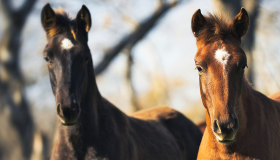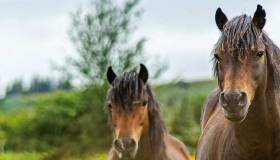DENVER/April 22, 2021 – Morris Animal Foundation, one of the largest nonprofits funding animal health studies globally, is pleased to announce the establishment of its Canine Scientific Advisory Board (CSAB). This board will award grants for research projects focused on dog health every year. Prior to 2020, when the Foundation tested this concept, it maintained a Small Animal Advisory Board, which awarded grants to both canine and feline health studies.
“For so many people including my family, life just wouldn’t be the same without our dogs. They deserve to have their own focus in our annual call for proposals,” said Dr. Janet Patterson-Kane, Morris Animal Foundation Chief Scientific Officer. “We are proud to bring together this group of canine health experts who will ensure we choose the best studies to help give dogs the longest, healthiest lives possible.”
The Foundation’s CSAB, now one of six scientific advisory boards at the Foundation, is comprised of 10 members who represent a diversity of scientific specialties and species expertise. Their review process ensures the Foundation supports the highest quality research by providing objective opinions from experts in the field. Each year, the boards evaluate hundreds of grant proposals in total and recommend which ones to fund, based on scientific merit and the potential to save lives, preserve health and advance veterinary care.
The founding members to this board are:
- Dr. Joshua Stern, the Board’s Chair, Associate Professor of Medicine and Epidemiology, University of California, Davis. He earned his DVM from The Ohio State University and his PhD from Washington State University. He is a Diplomate of the American College of Veterinary Internal Medicine (Cardiology). His expertise is in cardiology and genetics.
- Dr. Josh Daniels, Associate Professor, Diagnostic Bacteriology, Colorado State University. He earned his DVM from the University of Wisconsin-Madison and his PhD from Washington State University. He is a Diplomate of the American College of Veterinary Microbiologists (Bacteriology/Mycology) and brings expertise in infectious disease and diagnostic microbiology.
- Dr. Amy Durham, Associate Professor of Pathology, University of Pennsylvania School of Veterinary Medicine (Penn Vet). She earned her VMD from Penn and is a Diplomate of the American College of Veterinary Pathologists. Her expertise is in oncologic and comparative pathology.
- Dr. Brian Flesner, Assistant Professor of Oncology, University of Missouri. He earned his DVM from the University of Illinois, his MS from the University of Missouri, and is a Diplomate of the American College of Veterinary Internal Medicine (Oncology). His expertise is in medical oncology and chemotherapy/chemotoxicity.
- Dr. Matthew Krecic, Assistant Editor, American Veterinary Medical Association. He earned his DVM from The Ohio State University and is a Diplomate of the American College of Veterinary Internal Medicine. His expertise is in infectious diseases and immunology, endocrinology and diagnostic testing.
- Dr. Talisha Moore, Clinical Assistant Professor, University of Tennessee. She earned her DVM from Mississippi State University and brings expertise in neurology and neurosurgery.
- Dr. Jacqueline Neilson, Regional Consulting Veterinarian, Elanco Animal Health. She earned her DVM from the University of Florida and is a Diplomate of the American College of Veterinary Behaviorists. She brings expertise in canine behavior.
- Dr. Carlos Souza, Assistant Professor, Surgical Oncology, University of Florida. He earned his DVM from Brazil’s Sao Universidade Federal Rural do Rio de Janeiro and is a Diplomate of both the American College of Veterinary Internal Medicine (Oncology) and the American College of Veterinary Surgeons. Dr. Souza also has a Post-Doctoral Fellowship in Surgical Oncology. His expertise is in surgical oncology.
- Dr. Jan Suchodolski, Professor, Associate Director for Research and Head of Microbiome Sciences, Gastrointestinal Laboratory, Texas A&M University (TAMU). He earned his PhD from there and his MedVet and DrVetMed from Vetmeduni Vienna in Austria. He is a Diplomate of the American College of Veterinary Microbiologists (Immunology) and brings expertise in gastroenterology and the microbiome.
- Dr. Lauren Trepanier, Assistant Dean, Clinical and Translational Research, University of Wisconsin-Madison. She earned her DVM and PhD from Cornell University and is a Diplomate of both the American College of Veterinary Internal Medicine (Small Animal Internal Medicine) and the American College of Veterinary Clinical Pharmacology. Her expertise is in pharmacogenetics and clinical pharmacology.
Since 1950, Morris Animal Foundation has invested over $48 million in more than 1,060 canine health studies, including early research that contributed to the parvovirus vaccine and development of genetic tests for heart diseases, eye diseases and seizure disorders. The Foundation also is at the forefront of funding cancer studies in dogs, including hemangiosarcoma, lymphoma and osteosarcoma.
About Morris Animal Foundation
Morris Animal Foundation’s mission is to bridge science and resources to advance the health of animals. Headquartered in Denver, and founded in 1948, it is one of the largest nonprofit animal health research organizations in the world, funding more than $136 million in critical studies across a broad range of species. Learn more at morrisanimalfoundation.org.




